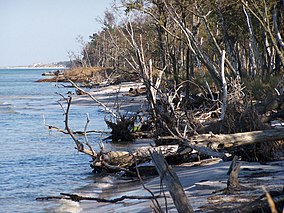West Pomeranian Lagoon Area National Park
| Western Pomerania Lagoon Area National Park | |
|---|---|
| Nationalpark Vorpommersche Boddenlandschaft | |
|
IUCN category II (national park)
|
|

Coastal vegetation
|
|
| Location | Mecklenburg-Vorpommern, Germany |
| Nearest city | and Stralsund |
| Coordinates | 54°28′N 12°54′E / 54.467°N 12.900°ECoordinates: 54°28′N 12°54′E / 54.467°N 12.900°E |
| Area | 805 km2 (311 sq mi) |
| Established | 1 October 1990 |
The Western Pomerania Lagoon Area National Park (Nationalpark Vorpommersche Boddenlandschaft) is Mecklenburg-Vorpommern's largest national park, situated at the coast of the Baltic Sea. It consists of several peninsulas, islands and lagoon shore areas in the Baltic Sea, belonging to the district of Vorpommern-Rügen.
The national park includes:
The national park is characterised by very shallow water housing a unique coastal fauna. All portions of the national park are famous for being a resting place for tens of thousands of cranes and geese.
Its area is 805 km².
Approximately half the area of the park is open Baltic Sea; more than another quarter covers parts of the lagoons in the Darss-Zingst Bodden Chain including the West Rügen Bodden. Thus it protects these shallow water areas (in the Baltic Sea, the National Park boundary is based on the ten-metre depth contour) with their rich flora and fauna. The differing salt content of the brackish water habitats of the Baltic and the bodden (shallow lagoons) contribute significantly to the local diversity of nature. For example, the Baltic Herring visits the shallow bays regularly to spawn here.
The territory of the national park includes parts of the Darß and the peninsula of Zingst as well as most of the island of Hiddensee. In addition, a narrow strip of land on the island of Rügen, next to the bodden lies within the national park. Pine and beech woods, such as the Darß Forest, cover much of the land. In treeless areas there are bogs, resulting from coastal flooding.
...
Wikipedia

